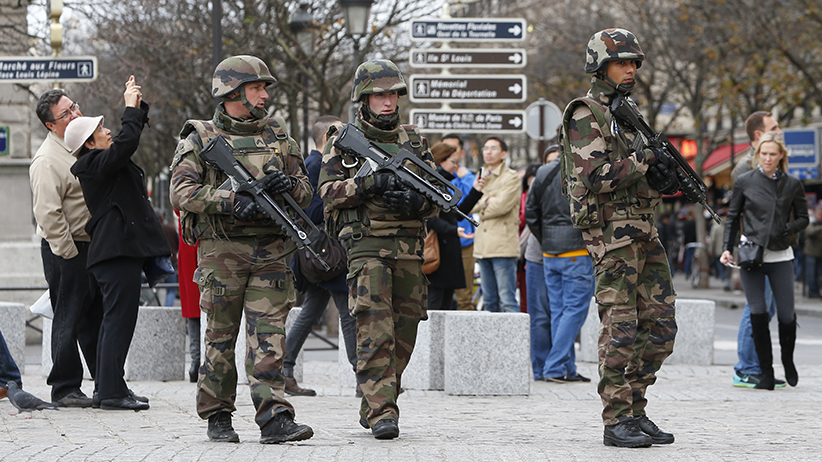The fallout from France
The attack in France was the 28th since 9/11 to take more than 100 lives. But it could outscale all the others in its effects.
Tourists pause to take pictures as French military patrol near the Notre Dame Cathedral (not seen) the day after a series of deadly attacks in Paris, France, November 14, 2015. (Yves Herman/Reuters)
Share

The horrific attack on Paris Friday night was far from the first terrorist attack since 9/11 to take more than 100 lives. In fact, it was the 28th, and that excludes smaller attacks like the Charlie Hebdo massacre, which took place just months earlier and blocks away. In 2015 alone, attacks similar in scale happened in Yemen in March, Kenya in April and Syria in June. A car bomb took more than a hundred Iraqis in July, and a suicide bomb killed even more Turks in October. Yet, last night’s horror may prove to outscale all others since 9/11 in its fallout, which will be both immediate and immense.
Two and a half hours after the first explosion, at 11 p.m., President Francois Hollande declared the first national state of emergency in a decade (the last time was due to nation-wide riots sparked by the death of two teenagers). Hollande dispatched an extra 1,500 military personnel and hundreds of extra police officers to patrol the streets, and as major museums and shops stayed closed, the Eiffel Tower turned out its lights in honour of the dead.
Internationally, Friday’s attacks will sway the response to the Syrian Civil War, now in its fifth year. Hollande will address the French Parliament on Monday and has so far vowed to be “merciless towards these barbarians” from Islamic State. While France was already considered the strongest ally of the Western-backed opposition in Syria, having been first to support a mission in Syria and launching a bombing campaign in September, the Paris attacks may pressure Britain to intensify its action. That could divide its left-wing opposition party, as some members may come to support foreign intervention, which Labour leader Jeremy Corbyn firmly opposes.
In Canada, Prime Minister Justin Trudeau will have to question his election promise to pull Canadian fighter jets out of the Islamic State-targeted mission in Syria. Asked about that commitment on Friday, Trudeau told reporters: “It’s too soon to jump to conclusions, but obviously governments have a responsibility to keep their citizens safe, while defending our rights and freedoms, and that balance is something the Canadian government, and indeed all governments around the world, will be focusing on.” He is likely to face pressure from U.S. and British allies this week to continue having some role in Syria.
Beyond France’s closest allies, the Paris attacks will impact countries in a way not seen since 9/11. Recall that three days after the World Trade Center was hit, the U.S. passed a law enabling the armed forces to use all necessary and appropriate means to stop all those who aided the attacks, and thus the NATO-backed “global war on terrorism” began. Now, international security will be a key topic at the G20 summit beginning Monday in Turkey. With some speculating that the refugee crisis brought ISIS sympathizers into France and supported the attacks, countries could revise their plans to accept refugees.
Citizen privacy, too, will change after Friday’s horror. The six attacks were well-coordinated, and the monitoring of Internet and telecommunication lines could prevent future attacks. Yet, such watchdogging will come at the cost of liberté—the first and foremost of French values. Hollande has already tightened security measures at monuments, government buildings and borders, adding to measures taken after the Charlie Hebdo massacre. Hollande has also authorized French police to physically search people more easily, enter their homes, and demand ID be shown immediately or within four hours at a police station.
While the attacks spark sweeping political action, they also lead civilians around the globe to mourn. Hundreds of Parisians have lined up to donate blood to victims, while Londoners took to the streets holding signs in solidarity with the French. The gestures hold semblance to those following the Boston bombings; on the morning following the marathon, a cartoon in The New Yorker depicted a Yankees fan wearing a Red Sox hat, telling his daughter, “today, we’re all rooting for Boston.” With the world anxiously following updates in France—consistently enough to cause Twitter technical difficulties—it’s certain that today, we’re all rooting for Paris.